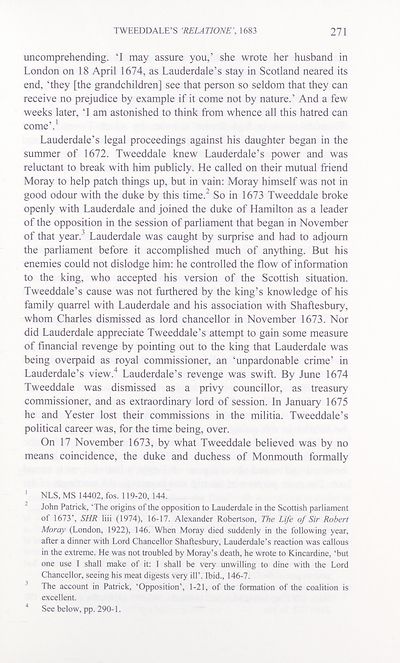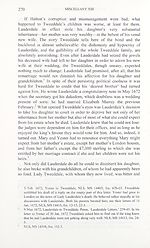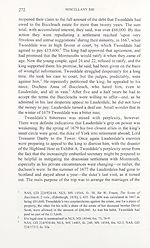Series 5 > Miscellany [of the Scottish History Society] XIII
(286) Page 271
Download files
Complete book:
Individual page:
Thumbnail gallery: Grid view | List view

TWEEDDALE’S RELATIONE’, 1683
271
uncomprehending. ‘I may assure you,’ she wrote her husband in
London on 18 April 1674, as Lauderdale’s stay in Scotland neared its
end, ‘they [the grandchildren] see that person so seldom that they can
receive no prejudice by example if it come not by nature.’ And a few
weeks later, ‘I am astonished to think from whence all this hatred can
come’.1
Lauderdale’s legal proceedings against his daughter began in the
summer of 1672. Tweeddale knew Lauderdale’s power and was
reluctant to break with him publicly. He called on their mutual friend
Moray to help patch things up, but in vain: Moray himself was not in
good odour with the duke by this time.2 So in 1673 Tweeddale broke
openly with Lauderdale and joined the duke of Hamilton as a leader
of the opposition in the session of parliament that began in November
of that year.3 Lauderdale was caught by surprise and had to adjourn
the parliament before it accomplished much of anything. But his
enemies could not dislodge him: he controlled the flow of information
to the king, who accepted his version of the Scottish situation.
Tweeddale’s cause was not furthered by the king’s knowledge of his
family quarrel with Lauderdale and his association with Shaftesbury,
whom Charles dismissed as lord chancellor in November 1673. Nor
did Lauderdale appreciate Tweeddale’s attempt to gain some measure
of financial revenge by pointing out to the king that Lauderdale was
being overpaid as royal commissioner, an ‘unpardonable crime’ in
Lauderdale’s view.4 Lauderdale’s revenge was swift. By June 1674
Tweeddale was dismissed as a privy councillor, as treasury
commissioner, and as extraordinary lord of session. In January 1675
he and Yester lost their commissions in the militia. Tweeddale’s
political career was, for the time being, over.
On 17 November 1673, by what Tweeddale believed was by no
means coincidence, the duke and duchess of Monmouth formally
1 NLS, MS 14402, fos. 119-20, 144.
2 John Patrick, ‘The origins of the opposition to Lauderdale in the Scottish parliament
of 1673’, SHR liii (1974), 16-17. Alexander Robertson, The Life of Sir Robert
Moray (London, 1922), 146. When Moray died suddenly in the following year,
after a dinner with Lord Chancellor Shaftesbury, Lauderdale’s reaction was callous
in the extreme. He was not troubled by Moray’s death, he wrote to Kincardine, ‘but
one use I shall make of it: I shall be very unwilling to dine with the Lord
Chancellor, seeing his meat digests very ill’. Ibid., 146-7.
3 The account in Patrick, ‘Opposition’, 1-21, of the formation of the coalition is
excellent.
4 See below, pp. 290-1.
271
uncomprehending. ‘I may assure you,’ she wrote her husband in
London on 18 April 1674, as Lauderdale’s stay in Scotland neared its
end, ‘they [the grandchildren] see that person so seldom that they can
receive no prejudice by example if it come not by nature.’ And a few
weeks later, ‘I am astonished to think from whence all this hatred can
come’.1
Lauderdale’s legal proceedings against his daughter began in the
summer of 1672. Tweeddale knew Lauderdale’s power and was
reluctant to break with him publicly. He called on their mutual friend
Moray to help patch things up, but in vain: Moray himself was not in
good odour with the duke by this time.2 So in 1673 Tweeddale broke
openly with Lauderdale and joined the duke of Hamilton as a leader
of the opposition in the session of parliament that began in November
of that year.3 Lauderdale was caught by surprise and had to adjourn
the parliament before it accomplished much of anything. But his
enemies could not dislodge him: he controlled the flow of information
to the king, who accepted his version of the Scottish situation.
Tweeddale’s cause was not furthered by the king’s knowledge of his
family quarrel with Lauderdale and his association with Shaftesbury,
whom Charles dismissed as lord chancellor in November 1673. Nor
did Lauderdale appreciate Tweeddale’s attempt to gain some measure
of financial revenge by pointing out to the king that Lauderdale was
being overpaid as royal commissioner, an ‘unpardonable crime’ in
Lauderdale’s view.4 Lauderdale’s revenge was swift. By June 1674
Tweeddale was dismissed as a privy councillor, as treasury
commissioner, and as extraordinary lord of session. In January 1675
he and Yester lost their commissions in the militia. Tweeddale’s
political career was, for the time being, over.
On 17 November 1673, by what Tweeddale believed was by no
means coincidence, the duke and duchess of Monmouth formally
1 NLS, MS 14402, fos. 119-20, 144.
2 John Patrick, ‘The origins of the opposition to Lauderdale in the Scottish parliament
of 1673’, SHR liii (1974), 16-17. Alexander Robertson, The Life of Sir Robert
Moray (London, 1922), 146. When Moray died suddenly in the following year,
after a dinner with Lord Chancellor Shaftesbury, Lauderdale’s reaction was callous
in the extreme. He was not troubled by Moray’s death, he wrote to Kincardine, ‘but
one use I shall make of it: I shall be very unwilling to dine with the Lord
Chancellor, seeing his meat digests very ill’. Ibid., 146-7.
3 The account in Patrick, ‘Opposition’, 1-21, of the formation of the coalition is
excellent.
4 See below, pp. 290-1.
Set display mode to:
![]() Universal Viewer |
Universal Viewer | ![]() Mirador |
Large image | Transcription
Mirador |
Large image | Transcription
Images and transcriptions on this page, including medium image downloads, may be used under the Creative Commons Attribution 4.0 International Licence unless otherwise stated. ![]()
| Scottish History Society volumes > Series 5 > Miscellany [of the Scottish History Society] XIII > (286) Page 271 |
|---|
| Permanent URL | https://digital.nls.uk/127316961 |
|---|
| Description | Over 180 volumes, published by the Scottish History Society, containing original sources on Scotland's history and people. With a wide range of subjects, the books collectively cover all periods from the 12th to 20th centuries, and reflect changing trends in Scottish history. Sources are accompanied by scholarly interpretation, references and bibliographies. Volumes are usually published annually, and more digitised volumes will be added as they become available. |
|---|


